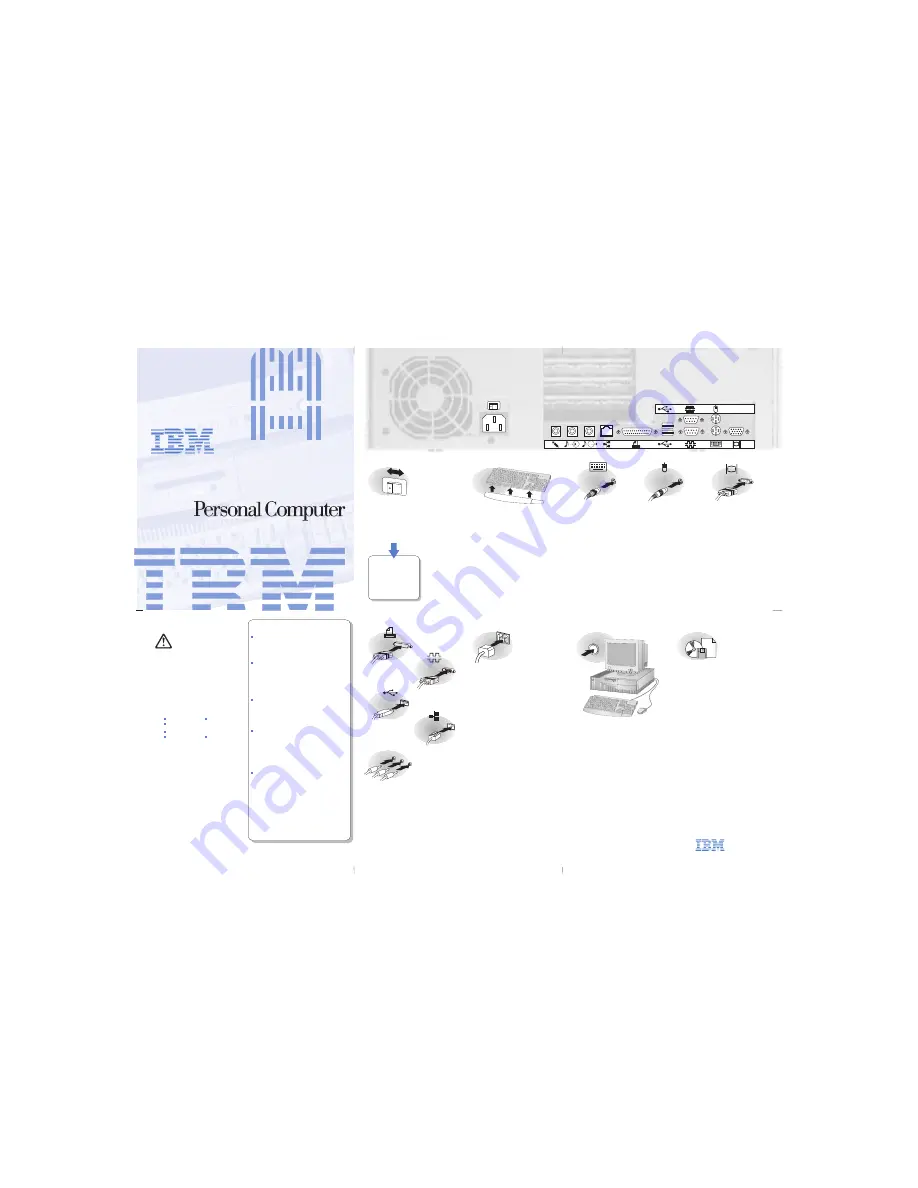
D4BE5001
PN 06J0839
FACIMILE ONLY
Setting Up Your
Connect the monitor
signal cable to the
monitor (if it is not
already attached),
then to the monitor
connector on the
computer.
PN 06J0839
© IBM Corporation 1998
All rights reserved.
Printed in the U.S.A.
Fold
line
Fold
line
3
4
Your computer has identification numbers
(serial and model/type) that you might
need if you ever have your computer
serviced. To locate these numbers and
record this information, see Appendix A
in
For information about IBM-installed
software, see
in
your applications package. Additional
programs and device drivers are on the
CD
and in some cases on other CDs and
diskettes. If you are installing your own
operating system, make sure you install
the device drivers after you install your
operating system. Installation instructions
are provided with the media or in
README files on the diskettes or CDs.
Using Your Personal Computer.
About Your Software
Ready-to-Configure Utility Program
Finish the
installation.
9
Connect the
power cords.
Turn on the monitor
and computer.
8
5
1
11
5
Check the position of the
voltage-selection switch.
Use a ballpoint pen to slide
the switch, if necessary.
Set the
voltage switch.
Connect the
keyboard cable.
Connect the
mouse cable.
Connect the
monitor cable.
Connect the keyboard
cable to the keyboard
connector.
Connect the mouse cable
to the mouse connector.
Fold
line
Fold
line
Connect any
additional devices.
11
5
Your computer might not have all the connectors shown.
Connect any
universal serial
bus (USB) devices.
Connect any printer or
other parallel device.
Attachment of the keyboard
extender is optional. It snaps into
the bottom edge of the keyboard.
Attach the
keyboard extender.
2
Voltage Switch Setting
115 or 115 V
230 or 230 V
Voltage Supply Range
90 –137 V ac
180–265 V ac
Turn on the monitor and other external
devices first, and then turn on the
computer. You see a logo screen while
the computer performs a short self-test.
Upon successful completion of the test,
the logo screen disappears, and the
software is loaded (in models with
preinstalled software).
Important: If you suspect a problem, see
the "Solving Problems" chapter in
.
Using
Your Personal Computer
Connect an external
modem or other
serial devices.
6
Important: Create a diagnostic diskette
for future use. For information about the
diagnostic programs provided with your
computer and instructions on how to
create the diagnostic diskette, see
.
Using Your Personal Computer
7
Read Me First
For models equipped
with the audio
feature, connect any
optional devices.
Note: For more
about this feature,
see
Using Your
Personal Computer.
For models equipped with
the integrated Ethernet
feature, connect the RJ-45
connector of an Ethernet
cable here to use this
feature. Contact your
network administrator for
more about using your
computer on your network.
Note: See
for
information about system
management features.
Using Your
Personal Computer
2
1
Fold
line
Fold
line
PC 300GL
Type 6275
PC 300PL
Type 6862
For information about arranging your
computer for comfort and ease-of-use,
refer to
.
Using Your Personal Computer
Before You Begin
Arranging Your Workspace
Where to Find Other Information
Using Your Personal Computer: This booklet,
included with your computer, provides
information about computer features. A version
of this booklet is also on the World Wide Web.
Understanding Your Personal Computer: This
publication provides additional information
about computer features. It is located on the
Ready-to-Configure Utility Program CD and in
the IBM Welcome Center in the IBM-installed
software in many models.
About Your Software: This booklet, included
with computers that have IBM-installed
software, describes the preinstalled software
package. (The exact content depends on the
type of software installed.)
Installing Options in Your Personal Computer:
This publication provides step-by-step
instructions for installing memory, adapters,
drives, and other options inside your computer.
This publication is available on the World Wide
Web and the Ready-to-Configure Utility
Program CD.
Service and Technical Information: These
publications provide information for developers
and trained service technicians.
You can find additional information at:
http://www.pc.ibm.com/us/cdt
Look in the "Getting Help, Service, and
Information" chapter in Using Your Personal
Computer for information on ordering
publications and for addresses of other
related IBM Web pages.
Important Information:
• When the power cord is first plugged
in, the computer powers on for a few
seconds, then powers off. This is a
normal operation.
• In some circumstances, the computer
might not power off immediately when
the power switch is pressed. In this
case, press the power switch until the
power turns off.
If there is a label covering the power
connector, remove it. Connect the
power cords to the computer, monitor,
and other devices first, and then plug
the cords into properly grounded
electrical outlets.
Make sure you have an adequate number
of properly grounded electrical outlets for
the computer, monitor, and any other
devices. Select a location for the computer
where it will remain dry. Leave about 50
mm (2 in.) of space around the computer to
allow for proper air circulation. Have your
computer publications handy in case you
need additional instructions.
You will need the following:
Computer
Monitor (sold
Computer
separately with
power cord
signal cable and
Keyboard power cord)
Mouse
Publications
If you are missing any items, contact your
place of purchase.
Set up and start your computer before
installing any internal options (such as
memory or an adapter). Refer to
for
option installation instructions.
Important: Be sure that you set up any
additional devices according to the
manufacturer's instructions before you
attach their cables to the connectors.
Installing
Options in Your Personal Computer
Installing Options?
1
2
DANGER
To avoid a shock hazard, do not
connect or disconnect any cables or
perform installation, maintenance, or
reconfiguration of this product during
an electrical storm.



















